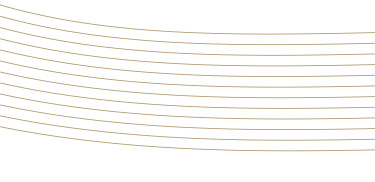6A new Olympic century (1988-2008)
The fall of the Berlin Wall in 1989, followed by the reunification of the two German States marked the end of the Cold War. After the Soviet bloc split up, the United States returned to top position on the leader board of sporting nations. The start of this new era also resulted from the abolition of apartheid and the release of Nelson Mandela in South Africa, while the 1992 Olympic Games in Barcelona were a successful commercial and media model. From this point of view, the Atlanta Games held in 1996 were a major turning point in the organisation of the Olympic Games, with increased brand presence.
The 20th century ended with the Sydney Games in 2000, that were intended to demonstrate reconciliation with aboriginal peoples. One year later, a new phase of international tensions opened with the attacks in New York on 11 September 2001. Under strong pressure regarding security, the Athens Olympic Games in 2004 were a burden on an already fragile economy.
Spared the financial crisis that hit the West, the Beijing Games in 2008 were the setting for a demonstration of force by China. The contested choice of a country that repressed the Uyghur and Tibetan people as political opponents placed the IOC before a question that had long been considered taboo: are apolitical Olympics still defensible?
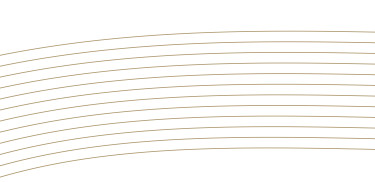

A new Olympic world
Modernised by the investments made to host the Games, Barcelona welcomed a transfigured world in 1992. A consequence of the end of the Cold War and the dislocation of the USSR was that twelve former Soviet Socialist Republics came together under the Olympic flag to be called the Unified Team. The Communist regime in Cuba, suffering from the end of Moscow’s economic aid but pursuing a pro-active sports policy, sent a delegation that brought home 31 medals. Another country took its place among the Olympic Nations: South Africa. It was reintegrated when the laws propping up apartheid were abolished in the summer of 1991. Freed after 27 years in detention, Nelson Mandela sat among the crowds at the opening ceremony.
Juan Antonio Samaranch, the IOC entrepreneur
“We have demonstrated that the Olympic Movement is livelier and stronger than ever” declared IOC President Juan Antonio Samaranch in 1992. Holding the Olympic Games in his home city illustrated this declaration of strength, related to the transformation he undertook at the IOC to make the Olympic Games a vast and flourishing commercial enterprise. This “Samaranch revolution” was notable for professional athletes and the commercialisation of the Games through sponsorship, merchandising and television rights.
The Dream Team, or professional stars at the Games
After the official end of the amateur requirement in 1981, the 1992 Dream Team was the symbol of the how the Games had become professional. The players of the United States basketball team played for the NBA, the American professional championship considered to be the best in the world. It was a collection of stars like Michael Jordan, Larry Bird or Magic Johnson. The American team literally crushed all their adversaries, contributing to the popularisation of basketball worldwide and offering new sparkle to the Olympic Games.

Legende
Barcelona 1992. Derartu Tulu and Elana Meyer, 10,000m final. Sport Illustrated Collection. Photographer John Iacono
Credit
© Getty
Two women, one hope
The final of the women’s 10,000 metres offered one of the strongest images in the history of the Olympic Games. The victory spot was between white South African Elana Meyer and black Ethiopian Derartu Tulu, who won the race. After they crossed the finish line, the two women fell into each other’s arms and improvised a joint lap of honour. This image of fraternity became a symbol for the whole world. South Africa got the opportunity to mark the beginning of a new era, that of the “rainbow nation”.

A city with two sides
Choosing Atlanta instead of Athens for the centenary of the Olympic Games was controversial. The city is the headquarters of Coca-Cola, historic sponsor of the Games, along with several multinationals. The choice was a strategic one for the IOC that wanted to launch a “new Olympic century”. The impression spread that the Olympic Games had become mainly about money to the detriment of the less advantaged. Installing Olympic sites in the city centre led to the displacement of many people, often from minorities, to the outskirts. In counterpoint, the opening ceremony celebrated the struggle of African-Americans for their rights, with a performance dedicated to Martin Luther King, a native of Atlanta. Mohamed Ali, a historic civil rights activist, by then suffering from Parkinson’s disease, lit the cauldron.
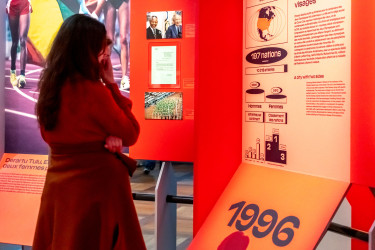
Legende
View of the rooms in the exhibition Olympism, a world history
Credit
© EPPPD-MNHI
The Games as a target
In the night of 27 July 1996, a makeshift bomb exploded in the middle of the crowd in the Olympic park, Centennial Park. The toll was two deaths and 110 people injured. The Games went on, however, interspersed with moments of silence in tribute to the victims. First a hero, then a suspect, security guard Richard A. Jewell was cleared after a highly publicised investigation. The guilty party, a far right terrorist, targeted the “ideals of global socialism”, supported he alleged, by the Olympic Games.
Marie-José Pérec and Laura Flessel : chanpyon’
While women represented one third of the athletes for the first time, two French women left their mark on the American Olympiad: Marie-José Pérec and Laura Flessel, both originally from Guadeloupe, where the term “champion” is pronounced “chanpyon” in Creole. Marie-José Pérec, the flag-bearer of the French delegation, won the gold medal in the 400 metres and the 200 metres. “La Guêpe” (The Wasp) Laura Flessel carried off the gold in individual and team fencing.

The varnish of unity
The Olympic Games in Sydney were the opportunity for the Australian government to make the process of reconciliation engaged with the native Australian populations, the Aboriginal and Torres Strait peoples, visible to the eyes of the world. The opening ceremony was a tribute to the history of Australia and the Aboriginal culture, a celebration that was perceived by some as being too folklorish. During the Games, people fighting for the rights of native peoples had their voices heard and they condemned persistent inequalities. The closing ceremony was notable for the gesture of rock band Midnight Oil, whose members wore t-shirts bearing the message “Sorry” to apologise to the Pintupi, victims of spoliation and massacres during colonisation, as told in the song “Beds are Burning”.
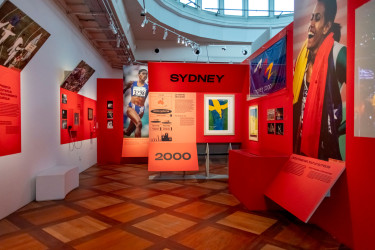
Legende
View of the rooms in the exhibition Olympism, a world history
Credit
© EPPPD-MNHI
Cathy Freeman : What a symbol
An Aboriginal woman from Queensland, Cathy Freeman’s grandmother came from the “stolen generations”, taken from her family to be raised by white people. She was chosen to light the Olympic flame and embody a reconciled Australia. Her most noteworthy gesture, bitterly negotiated beforehand between the Australian leaders and the IOC was the lap of honour after her victory in the 400 metres during which she waved both the Australian flag and the aboriginal flag that had only been recognised five years earlier.
The Paralympic Games, worldwide recognition
The Sydney Paralympic Games in 2000 changed the way they were regarded due to the exceptional sporting level and growing recognition. Although they had been held at the same sites as the Olympic Games since Seoul in 1988, the 2000 Games were a turning point, bringing together 3,879 athletes from 123 countries with 18 sports on the programme. One million two hundred thousand entrance tickets were sold and 300 million viewers watched the competitions on television.
Olympic presence, political recognition
In 1999, one year before the Games, a referendum for self-determination launched the process of independence of Timor-Leste, colonised by Portugal until 1975, and then occupied by Indonesia. Under the administration of the United Nations, the territory did not meet the conditions for Olympic recognition. However, at the request of the UN and Australia, very involved in the international peacekeeping force, the IOC allowed Timor-Leste to send a delegation to the Games as individual Olympic athletes.

Return to the roots
As in 1896, the 2004 Olympic Games in Athens were sprinkled with symbols of Antiquity. The desire expressed by the IOC and by the authorities in the host country legitimised the modern Olympic Games. Archaeological sites were renovated, in particular Olympia. The emblem of the Games featured an olive wreath, which the winner received at the Ancient Games; a sponsor offered one to each medal-winner. The mascots Phivos and Ahina represented respectively Apollo and Athena. The path of the Olympic flame crossed all of the countries that had hosted the summer or winter Olympic Games in the modern era. The opening ceremony also paid strong tribute to Greek mythology, history and civilisation, as the cradle of European civilisation, as well as Olympism.
Pýrros Dímas : National hero
Already the flag-bearer for the Greek delegation to Sydney, weightlifter Pýrros Dímas was once again given this honour due to his impressive list of trophies: three-time World champion and three-time Olympic champion, making him the most successful Greek athlete in modern Olympism. The nation’s sporting hero was born in Albania, a country that he left in a clandestine manner in 1991, as part of massive Albanian migration to Greece. Made a Greek citizen in 1992, Pýrros Dímas escaped the racism that affected Albanians.
A crisis as legacy
Investments were colossal, but delays built up. The remedial measures weighed heavily on the country’s coffers, as did the security budget for the first Olympic Games to be held since 11 September 2001, just weeks after the Madrid attack in March 2004, and after several bomb attacks took place in Greece. After the Games, a major part of the sporting facilities built for the event were abandoned. Hosting the Olympic Games contributed to the economic crisis that hit Greece after 2008.

Legende
Athens 2021. The sites of the 2004 Olympic Games are now abandoned and off-limits, with security guards controlling access day and night. Pictured here is the Volleyball stadium. Omnisports Magazine report from 2021. Photographer Sébastien Leban
Credit
© PresseSports

A demonstration of strength
By hosting its first Olympic Games, China confirmed its economic and cultural strength through the prism of sport. The opening ceremony, that celebrated Chinese history on stage, was held in the “Birds nest” Olympic stadium with remarkable and spectacular architecture. The cauldron was lit by the former gymnast Li Ning, founder of the eponymous brand, the premier sports equipment manufacturer in the country. Investments were massive and the facilities were cutting-edge. Broad media coverage was handled by a company specially founded for the occasion, to respect the laws the restricted foreign investments. The sporting results were commensurate: China finished first. However, these Olympics raised some political and environmental questions.
Liu Xiang : Dashed hopes
Liu Xiang, gold medal in the 110 metres hurdles in Athens and figurehead of Chinese sporting greatness, was the hero of an entire nation. His withdrawal due to injury in 2008 in Beijing caused such sharp disappointment that his American sponsor Nike, out to conquer the gigantic Chinese market, was held responsible for his forfeit. Through this athlete, the Chinese-American duel took on a new form that prefigured the coming decade.
Protests
The hosting of the Olympic Games by China sparked an international campaign to defend human rights and the environment. The torch relay galvanised the protests. Demonstrations were held in Paris. In that context, a pro-Tibetan demonstrator violently accosted a para-fencer to wrench the torch from her. This image was used by the Chinese authorities to demonise their opponents. One year later, the IOC imposed a rule that the path of the torch would remain inside the national borders.
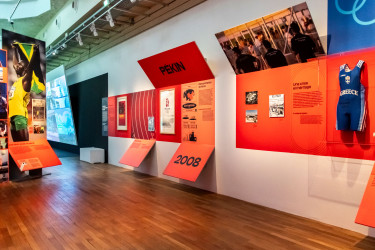
Legende
View of the rooms in the exhibition Olympism, a world history
Credit
© EPPPD-MNHI
Usain Bolt : Flash of genius
After a world record in the 100 metres, Jamaican Usain Bolt was among the favourites at the Beijing Games. The media closely followed this outstanding sprinter who was coveted by the sponsors. For his first Olympic final, he established a new world record in the 100 metres at 9.69 seconds, with astonishing ease, slowing his efforts when he was twenty metres from the finish line. A few days later, he repeated the exploit by winning the 200 metres with a new world record in 19.3 seconds, and then winning the gold medal in the 4x100 metres.
